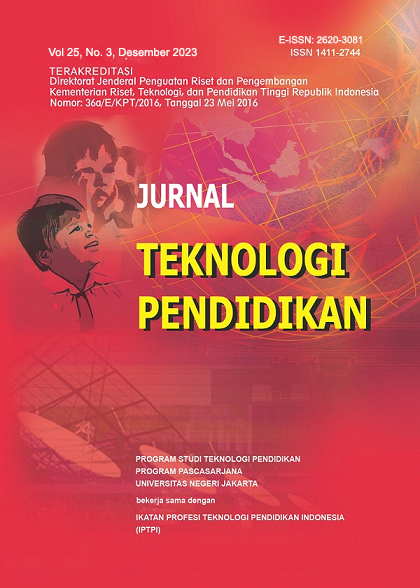Implementation of Waterfall Method in Model Development to Improve Learning Quality of Computer Network Courses
Abstract
This research aims to improve the learning quality of Computer Network course through the implementation of Waterfall method in the development of learning model. Waterfall method, with its focus on systematic and sequential approach in software development, is adapted to design and implement effective learning structure. This study uses qualitative research design with data collection through observation, interview, and documentation. Data analysis was conducted using content analysis method to evaluate the effectiveness of Waterfall-based learning model implementation. The results show that the implementation of Waterfall method facilitates structured planning, systematic development of learning materials, and continuous evaluation, which overall contribute to the improvement of learning quality. The developed learning model encourages students' active participation and improves the understanding of key concepts in Computer Networking. This research confirms that the Waterfall method can be effectively used outside the context of software development, particularly in improving the quality of learning in the academic field.
References
Alfredo, R., Echeverria, V., Jin, Y., Yan, L., Swiecki, Z., Gašević, D., & Martinez-Maldonado, R. (2024). Human-centred learning analytics and AI in education: A systematic literature review. Computers and Education: Artificial Intelligence, 6. https://doi.org/10.1016/j.caeai.2024.100215
Derakhshan, A. (2022). The 5Cs Positive Teacher Interpersonal Behaviors Implications for Learner Empowerment and Learning in an L2 Context. In Second Language Learning and Teaching (pp. 1–141). Springer Science and Business Media Deutschland GmbH. https://www.scopus.com/inward/record.uri?eid=2-s2.0-85142666770&partnerID=40&md5=d13caaea5ff918ec43642691dc9334fb
Doumas, K., & Avery, H. (2024). Lives ‘on hold’ in Europe: an explorative review of literature on youth aspirations and futures in situations of migration and mobility. European Journal of Futures Research, 12(1). https://doi.org/10.1186/s40309-023-00225-x
Drugova, E., Zhuravleva, I., Zakharova, U., & Latipov, A. (2024). Learning analytics driven improvements in learning design in higher education: A systematic literature review. Journal of Computer Assisted Learning, 40(2), 510–524. https://doi.org/10.1111/jcal.12894
Hughey, D. (2009). Comparing Traditional Systems Analysis and Design with Agile Methodologies. University of Missouri - St Louis. http://www.umsl.edu/~hugheyd/is6840/waterfall.html
Ilomäki, L., Lakkala, M., Kallunki, V., Mundy, D., Romero, M., Romeu, T., & Anastasia, G. (2023). Critical digital literacies at school level: A systematic review. Review of Education, 11(3). https://doi.org/10.1002/rev3.3425
Imjai, N., Aujirapongpan, S., & Yaacob, Z. (2024). Impact of logical thinking skills and digital literacy on Thailand’s generation Z accounting students’ internship effectiveness: Role of self-learning capability. International Journal of Educational Research Open, 6. https://doi.org/10.1016/j.ijedro.2024.100329
Isaias, P., & Issa, T. (2015). High level models and methodologies for information systems. In High Level Models and Methodologies for Information Systems. Springer New York. https://doi.org/10.1007/978-1-4614-9254-2
Li, H., & Yoon, S. J. (2024). Anchoring in the meso-level: Departmental preparation for the adoption of blended learning in tertiary education. System, 121. https://doi.org/10.1016/j.system.2024.103239
Mochnacs, A.-E., Pirciog, S., Sigurjonsson, T. O., & Grigorescu, A. (2024). A conceptual review of the higher education system based on open innovation (OI) perspectives. Humanities and Social Sciences Communications, 11(1). https://doi.org/10.1057/s41599-024-02909-6
Rabelo, A., Rodrigues, M. W., Nobre, C., Isotani, S., & Zárate, L. (2024). Educational data mining and learning analytics: a review of educational management in e-learning. Information Discovery and Delivery, 52(2), 149–163. https://doi.org/10.1108/IDD-10-2022-0099
Rahimi, A. R. (2024). A tri-phenomenon perspective to mitigate MOOCs’ high dropout rates: the role of technical, pedagogical, and contextual factors on language learners’ L2 motivational selves, and learning approaches to MOOC. Smart Learning Environments, 11(1). https://doi.org/10.1186/s40561-024-00297-7
Seel, N. M., Lehmann, T., Blumschein, P., & Podolskiy, O. A. (2017). Instructional Design for Learning: Theoretical Foundations. In Instructional Design for Learning: Theoretical Foundations. Sense Publishers. https://doi.org/10.1007/978-94-6300-941-6
Shebaro, M., de Moura, L. N., & Tešić, J. (2024). Improving association discovery through multiview analysis of social networks. Social Network Analysis and Mining, 14(1). https://doi.org/10.1007/s13278-023-01197-3
Tavares, V. (2020). Multidisciplinary perspectives on international student experience in Canadian higher education. In Multidisciplinary Perspectives on International Student Experience in Canadian Higher Education. IGI Global. https://doi.org/10.4018/978-1-7998-5030-4
Tsai, Y.-Y., Wu, T.-L., & Chen, L.-G. (2024). Exposure to netflix enhances listening effort and learning motivation among MICE learners. Journal of Hospitality, Leisure, Sport and Tourism Education, 35. https://doi.org/10.1016/j.jhlste.2024.100486
Copyright (c) 2023 Sulfikar Sallu, Yhonanda Harsono, Otto Fajarianto

This work is licensed under a Creative Commons Attribution-ShareAlike 4.0 International License.
Jurnal Teknologi Pendidikan is an Open Access Journal. The authors who publish the manuscript in Jurnal Teknologi Pendidikan agree to the following terms.
Attribution-ShareAlike 4.0 International (CC BY-SA 4.0)
-
Attribution — You must give appropriate credit, provide a link to the license, and indicate if changes were made. You may do so in any reasonable manner, but not in any way that suggests the licensor endorses you or your use.
-
ShareAlike — If you remix, transform, or build upon the material, you must distribute your contributions under the same license as the original.
- No additional restrictions — You may not apply legal terms or technological measures that legally restrict others from doing anything the license permits.
Notices:
- You do not have to comply with the license for elements of the material in the public domain or where your use is permitted by an applicable exception or limitation.
- No warranties are given. The license may not give you all of the permissions necessary for your intended use. For example, other rights such as publicity, privacy, or moral rights may limit how you use the material.








